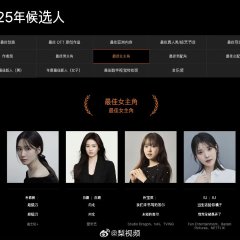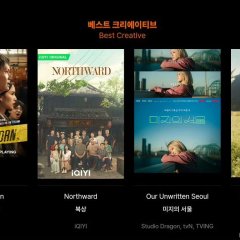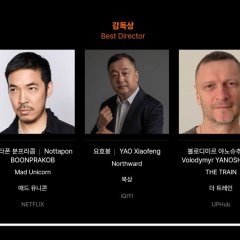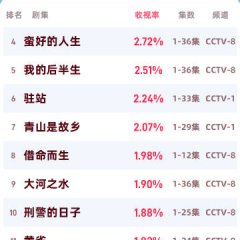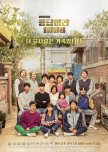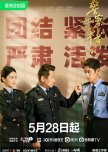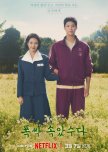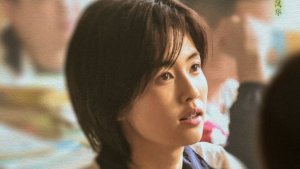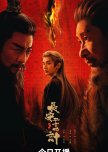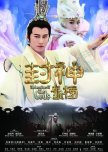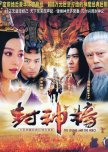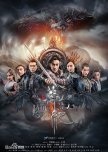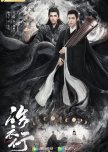 Chinese star Bai Lu talks about the most stressful drama of her career
Chinese star Bai Lu talks about the most stressful drama of her career The story revolves around several boys and girls who grew up along the canal. After parting ways to forge their own paths, they reunite years later, navigating the struggles of competition and life’s pressures while rediscovering hope for a new beginning. Through the perspective of these Jiangnan youths, the audience not only witnesses their growth but also experiences the historical transformations of the Grand Canal, which has evolved over a century from dry spells to rejuvenation. (Source: iQiyi) ~~ Adapted from the novel "Bei Shang" (北上) by Xu Ze Chen (徐则臣). Edit Translation
- English
- ภาษาไทย
- Русский
- हिन्दी
- Native Title: 北上
- Also Known As: Bei Shang , Northwards
- Director: Yao Xiao Feng, Zhou Nan
- Screenwriter: Zhao Dong Ling
- Genres: Youth, Drama, Family
Where to Watch Northward
Subscription (sub)
Cast & Credits
- Bai LuXia Feng HuaMain Role
- Ou HaoXie Wang HeMain Role
- Zhai Zi LuShao Xing ChiMain Role
- Gao Zhi TingZhou Hai KuoMain Role
- Vanda MargrafMa Si YiMain Role
- Liu Heng FuChen RuiMain Role
Reviews

This review may contain spoilers
A coming of age & slice-of-life masterpiece that I will never forget
My review will contain spoilers, but I'll warn before spoiling, so you can read the safe parts before watching the show! Also, be ready, this is going to be long, but this drama is so excellent that it's hard to stop myself lolIf you look into my profile, you will know how many korean and chinese dramas I have watched. I rarely write reviews, but I feel like I need to write one for Northward (and also I've been obsessed with this drama since day 1 so I hope writing it all out will help me think of something else lmao).
If you're hesitating to watch this drama : go ahead and try it. This is a masterpiece. But you need to know two things before going : first, this drama was made to be realistic, no character is perfect ; second, while watching, you must analyze the characters yourself through their dialogues and actions and not let characters tell you how A or B is (even when they're talking about themselves). If you're confused about my second advice, here is what I can tell you : in life, you don't necessarily understand your decisions or other people's decisions. You can misinterpret other people, and misinterpret yourself, especially when you're young. So if a character tells you he did this for Y reason, or he thinks X, that doesn't mean it's true. You need to look at what they do and what they say when confronted to the situation to actually know how they feel about something. So, while watching this show, you musn't take everything at face value, you have to analyze their actions and dialogues to actually know the truth If you don't, you're likely to misunderstand them.
This is actually the reason why I loved this drama so much, and why I say it's a masterpiece. Weirdly, my favorite scenes are almost only scenes where characters fight or confront each other, because that's the moments when you actually understand the characters motivations and sufferings. Otherwise, they don't talk about it, just like we don't spend our time talking about what we feel or why motivate us to do X ou Y. We only talk about it in specific contexts.
I know a lot of people hated on Wanghe sometimes, and I get it, but he's definitely my favorite character here. He is so complex and realistic and a mess (just like 4D people are). He was a delight to analyze. I've been supporting him since the beggining and seeing his growth was such a pleasure.
Every character is interesting, very well written and complex, even the less important ones. I admire the screenwriters for how they managed to create such deep and realistic characters.
The cinematography is exceptional ; I was already a big fan of Yao Xiao Feng after seeing Tender Light, and his work here is just as wonderful. I am very peaky regarding the cinematography of the shows that I watch, so when I compliment it, it means it really is great.
I wrote an analysis of the first 28 episodes a few days ago ; you can find it here : https://kisskh.at/740015-bei-shang#comment-21293186 .
--- SPOILERS AHEAD ---
I am SO glad it wasn't a sad ending. I was scared they would end it with Fenghua dying because she deserved so much better, and I felt like Wanghe had gone through enough deads. First Siyi's grandma, then Siyi's little brother, then his employee. And he blames himself for each of them. I can't imagine how much he would have blame himself if Fenghua died. He would've thought he should've made a move on her sooner to enjoy her presence more.
But thanks god : it did not happen. Everyone got the happy ending they deserved.
I am glad the drama didn't push the Siyi/Wanghe agenda too much. As I said in my previous analysis, for me, Wanghe never truly loved Siyi (as a woman). And I don't think Siyi feelings for Wanghe were very deep either. They probably were more linked to her fear of being abandoned, and she may have felt like Wanghe was "abandoning her" everytime she saw him with Fenghua (which made sense, because Wanghe never planned his future with Siyi, outside of his promises to "take care of her", that were, to me, the proof he had a savior syndrome with her). At the end, when they're all watching footages of the younger them and we see Wanghe and Fenghua's interactions, it's so obvious that Wanghe already had romantic feelings for her (even the friends make fun of them and say they're "having a date on the balcony").
I loved LOVED every Wanghe/Xingchi confrontation. As an anti-capitalist myself, I saw my own ideals in Xingchi's, and yet I sided with Wanghe, especially in the fight episode 31. To me, Xingchi thought too high of himself. He thought only his values were important, and that his employees were stupid to put their lives on the line just to get money. It was easy for him to dismiss Wanghe and them by saying they're "evil capitalist". But, in my opinion, it only sounded like a selfish character who imposed his values on other people. I would even say... he sounded like a priviliged character. Just like Wanghe said, it's easy to say money isn't important when you're not hungry ; but when you need money to survive and support your family, money IS (sadly) important. Aknowledging that doesn't make Wanghe the evil capitalist everyone thought he was (including Fenghua). On the opposite, he understood better than anyone that the true problem was political. People shouldn't have to put their life on the line to survive, but the truth is, they sometimes have to, and he could only make sure they would get correctly paid for it. What Xingchi did was foolish and selfish, and not truly for his employee's wellbeing, but he was too immature to understand it. If he wanted to fight for what was right, he either had to climb in a waaay higher position, or make an union with his employees and protest against the politics, or make his own business with his own rules (like Fenghua). Instead of thinking he knew better his employee's needs than themselves, he should have asked himself why they were ready to put their life in danger just for money. And he should have understood their distress, instead of dismissing it and stopping them from making the money the needed. To me, that fight showed that, despite Xingchi's sad background, he was still a boy who knew he had parents and friends who were ready to provide for him if needed. Not even once did he try to understand why people were desperate for money.
Wanghe, on the other side, definitely made mistakes, but he was trying to actually change things in a way higher scale than Xingchi. The scene where Xingchi sees his ex employees eat outside and screams about how unfair it is that the cafetaria got shut down, meanwhile Wanghe actually takes action with his boss to provide correct meals to the employees, shows exactly that - Xingchi was all talk, Wanghe tried to take actions. He's definitely the most misundertsood character in this show : he was not cold-blooded, he just believed he could actually change things from the inside, even if it meant making sacrifices by doing things that did not align with his values and tiring himself out.
One of my favorite scene of the show is when the company refuses to pay compensations for He's death. The way his heart hurts, and he loses balances, and he feels sick, how he throws up in the toilets and curls himself up, all of that filmed as if it was a horror movie : to me, that's when Wanghe realized how much his efforts were in vain, and how evil the world was. He was in so much pain it literally made him sick, but no one knows about that. He doesn't talk about it. And he will forever be seen as the "shark that thrives in Beijing" (to quote Xingchi's lines to describe him).
Wanghe was never thriving in Beijing. He had failures after failures, and a huge pressure on his shoulders. Remember how he was told by his father, as a child, to succeed in life to make him proud? How many promises he made to everyone, that he would succeed and be there for them? And how he thought he needed to be rich to deserve Fenghua? He was not thriving, he was dying inside trying to succeed. In a dialogue with Fenghua, he says himself he can never show his vulnerable side (which shows that he is already suffering) ; later, he says to Haikuo how tired he is in Beijing (and yet he chooses to stay there for the funerals). In Beijing, the easy-going and (apparently) confident Wanghe was so stressed out he had stomach issues (they're mentionned in the beginning of the adult era, as something recurrent for him). But no one aknowledges that because Wanghe just never complains.
Another of my favorite scenes (I think it's my top 1) is the fight between Fenghua and Wanghe in episode 24. That's when Wanghe needed a wake-up call, because he was making ruthless decisions. Xingchi and Haikuo both tried to confront him about it and both only managed to make him angry. The only character who knows how to handle Wanghe is Fenghua : he goes to her already pissed off about his fight with his friends, persuaded he's in the right. Fenghua knows it's useless to scream or attack him. She begins by complimenting him, making him dream of the future he so desperately wants (him being successful). When he takes the bait, and starts seeing himself in this success and tells her he will make her as famous as him, she slaps him with the hard truth : "that day will never come, because I need to stay away from a company who doesn't treat well their employees". BAM. And then she calls him cold-bloooded. DOUBLE BAM. I loooved this scene so much because you can see just how hurt he is. He didn't question himself before that, and if that worked, it's not only because it's Fenghua (of all people) who tells him that, but also because she handled him just right. She's such a smart girl, and the only one who actually gets him and knows how to get to him.
To conclude this (way too long) review, I need to talk about Chen Rui and Haikuo. I loved, loved Haikuo. He was a sensitive lost boy and a certified lover boy. He took so much after his father, and I mean it in the best way, because Yan Lin was the best father of the show (imo). Chen Rui was my second favorite character after Wang He (Fenghua is not in this ranking because she's so much better than the other characters). His crave for his mother's akwnoledgment was so touching. I just love his confrontation with his mother in episode 27 ("the boy who is worthless in the eyes of the world will be recognized by his family. all he needs is just a little trust.").
So, this review is way too long, but hopefully there are people as obsessed by Northward as me who are willing to read all of this. The fact that I have to make myself stop here because I could talk about the details of this drama for hours just shows how good this show is!
Was this review helpful to you?

No place like home.
Based on an award winning novel, Northward is a heartwarming and realistic coming of age and cultural heritage story about a number of Jiangnan youths who grew up along the Grand Canal. The story opens with the lively and carefree young kids from Flower Street cavorting mischievously in the canal under the indulgent, watchful eyes of their community. One day, Granny Ma's exotic granddaughter Siyi, a solemn and lonely lost child, comes to live with her. The neighbourhood embraces her warmly and the kids rally around her protectively. The drama captures the communal spirit of the early 2000s, where the hard working families of Flower Street are by no means rich but by pooling their resources, they share each others burdens and navigate life's ups and downs together. All the child actors were superb and well cast. They made me invested in all of the characters from the get go; from the ringleader Wanghe, the steadfast Haikuo, the studious Chen Rui, the resentful Xingzhi and Huazi the tomboy with a heart of gold.Into their teen years, the realities of life and changing times intrude upon the idyllic times along the canal. The advent of superhighways and high speed trains make it more difficult for the citizens along the canal to make a living from the waterway. As their families struggle to make ends meet, the young friends vow to head north to Beijing for college with big, life changing dreams. Time moves too slowly for the young friends as they grapple with their parents’ financial and personal struggles—their strengths, weaknesses, and all-too-human imperfections. Life's challenges overwhelm the burgeoning attraction some of them start to feel for each other. In such a close-knit community, everyone is so closely tangled into everyone's lives that there are no real secrets between them. There is as much laughter as there are tears to go around as all too soon some of them discover that actions have consequences, some that are irreversible. This was by far the best arc as veteran actors including Hu Jun and Li Naiwen anchor immersive performances from the younger ensemble cast to authentically bring to life the joys, sufferings, regrets, and human failings of three generations of Flower Street.
The narrative loses its early charm in the later Beijing arcs. The business plots are realistically written and reflect the intense competition and challenges faced by the food delivery and courier services in China. In pursuit of their dreams, the young friends discover there is no place like home. The denizens of the big city are harsh, duplicitous and calculating. They discover triumphs are hard won after many sacrifices, setbacks and betrayals and they can only have each others backs. Conflicts arise as they search for their own bottom lines in the ruthless battle for business survival. What I didn't like is that they remained such a clique that none of them really let anyone else into their lives. Even Haikuo never really tried to include his girlfriend in their closed circle. I'd have liked to see Wanghe have a real love rival and Huazi not be so absolute and single minded in her feelings. I also wish Huazi had made her health choices for herself and not because of anyone else. But my biggest criticism of the character stories has to do with how Siyi simply ghosted everyone. That was profoundly selfish and cruel in a way that destroyed her character for me. I was also a bit disappointed that the unresolved issues between Siyi and Wanghe and to some extent even Chen Rui were just swept under the rug. The ending was a little bit too good to be true but I loved all the characters so much that its not a real gripe.
All of the young actors deliver heartfelt performances with Li Wanda and Zhai Zilu best capturing that sense of adolescent turmoil and displacement. Even though they were still credible, both Ou Hao and Bai Lu struggled more with the teen years. Past thirty, it is incredibly difficult for actors to recapture that angsty uncertainty and unconscious radiance of youth. While the Beijing storyline falters in narrative cohesion, both Ou Hao and Bai Lu grow into their roles well as struggling young entrepreneurs so well that I understand the casting decision. I enjoyed watching Bai Lu take on this kind of tomboy role even though the braces and short hair did not make her look any less gorgeous. By design, Siyi was the most intriguing character in the story so I was disappointed by how Li Wanda's character got sidelined. All things considered a very enjoyable and moving slice of life story that I rate 8/10. The first half was notably stronger, tracking closer to an 8.5.
Was this review helpful to you?
Recent Discussions
| Title | Replies | Views | Latest Post | |
|---|---|---|---|---|
| Mini Profile of Vanda Margraf, emerging star actress by Frost_edelweiss | 2 | 0 | anne Jun 6, 2025 | |
| Mini Profile and Filmography of Bai Lu (illustrated) by Frost_edelweiss | 5 | 0 | Frost_edelweiss May 7, 2025 | |
| Companion piece for Northward / Beishang by Frost_edelweiss | 19 | 0 | Eignn Apr 9, 2025 | |
| Airing schedule by Little Daisy | 0 | 0 | No discussions yet | |
| 《北上》作者:徐则臣 Novel Discussion by flours | 4 | 0 | Ruhi0202 Mar 4, 2025 | |
| «Director Yao Xiaofeng Praises Bai Lu’s Dedication & Stunning Transformation for Northward» by Sana | 0 | 0 | No discussions yet | |










